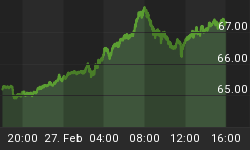IBM won’t be going down without a fight. The company is trying to re-invent itself through blockchain innovations, and has even emerged as the early leader in the still-embryonic industry.
In Juniper's Blockchain Enterprise survey, 43 percent of enterprises ranked IBM first, more than twice 20 percent by second-placed Microsoft.
IBM is an old-tech company whose core business of selling large physical servers to enterprises has been seriously disrupted by the cloud server model. Big Blue itself has been making in-roads into the cloud space with heavy Bluemix Cloud investments, though it still has a long way to go to catch up to Amazon's AWS or Microsoft Azure, ranked first and second in the industry.
IBM endured a revenue tailspin that stretches back more than 20 quarters, only managing to break the unfortunate streak last term.
Consequently, IBM stock has lost nearly 30 percent of its value over the past five years.
That has forced even an ultra-long like Warren Buffett to dramatically cut his IBM holdings, the stock's generous 4-percent dividend yield notwithstanding.
IBM's Blockchain in the Supply Chain
One of the sectors that IBM has been targeting with its blockchain technology is the supply chain. Related: China’s $33 Trillion Finance Industry Opens To Foreign Investment
The company aims to revolutionize the supply chain process by building blockchain applications atop its Hyperledger Fabric.
In 2017, the company partnered with shipping giant Maersk to build blockchain solutions that shipping supply chains can use to streamline the stodgy paper processes and cut costs.
A 2013 study by the World Economic Forum reported that reducing friction around border administration and information sharing in international trade can potentially increase global GDP by between 5-15 percent, translating to trillions of dollars every year.
IBM has even taken that idea a step further. The company has entered into a joint venture with a slew of jewelry firms to develop blockchain technology that will be used to track the origin of jewelry and check whether it has been ethically sourced.
The companies will initially use the technology to track six styles of diamond and gold engagement rings. The immutability of the secure blockchain ledger makes it an ideal choice for use in the supply chain to reduce fraud and errors.
IBM is not exactly a pioneer in the field: Leading industry players including De Beers and Fura Gems are already developing similar solutions in a bid to eliminate 'blood diamonds' from their supply chains.
In 2017, De Beers, responsible for mining 30 percent of the world's diamond supply, announced that it was in the process of creating the industry's first blockchain ledger to trace stones right down to their mines of origin.
Conflict diamonds are rampant in parts of Africa where government-backed troops or rebel militia use them to fund violence and repression against civilian populations.
IBM Watson and IoT
IBM is not content to just dominate a few blockchain niches but rather is looking to cover as many bases as possible.
Related: Western Union Eyes China's $1 Trillion Fintech Market
The company is busy working on pilots in finance, healthcare and, notably, the Internet of Things (IoT). IBM is seeking a patent to use blockchain to connect IoT devices via the ‘Watson IoT platform,’ which will allow IoT devices to send data to private ledgers and tamper-resistant records.
It appears as if IBM is keen to live up to CEO Gini Rometty's quote that:
“Blockchain will do for transactions what the internet did for information.”
Hopefully, IBM will remain at the forefront of the half-a-trillion-dollar-industry revolution.
By Alex Kimani for Oilprice.com
More Top Reads From Safehaven.com:
















